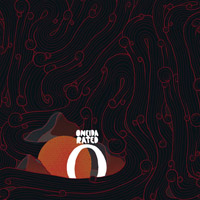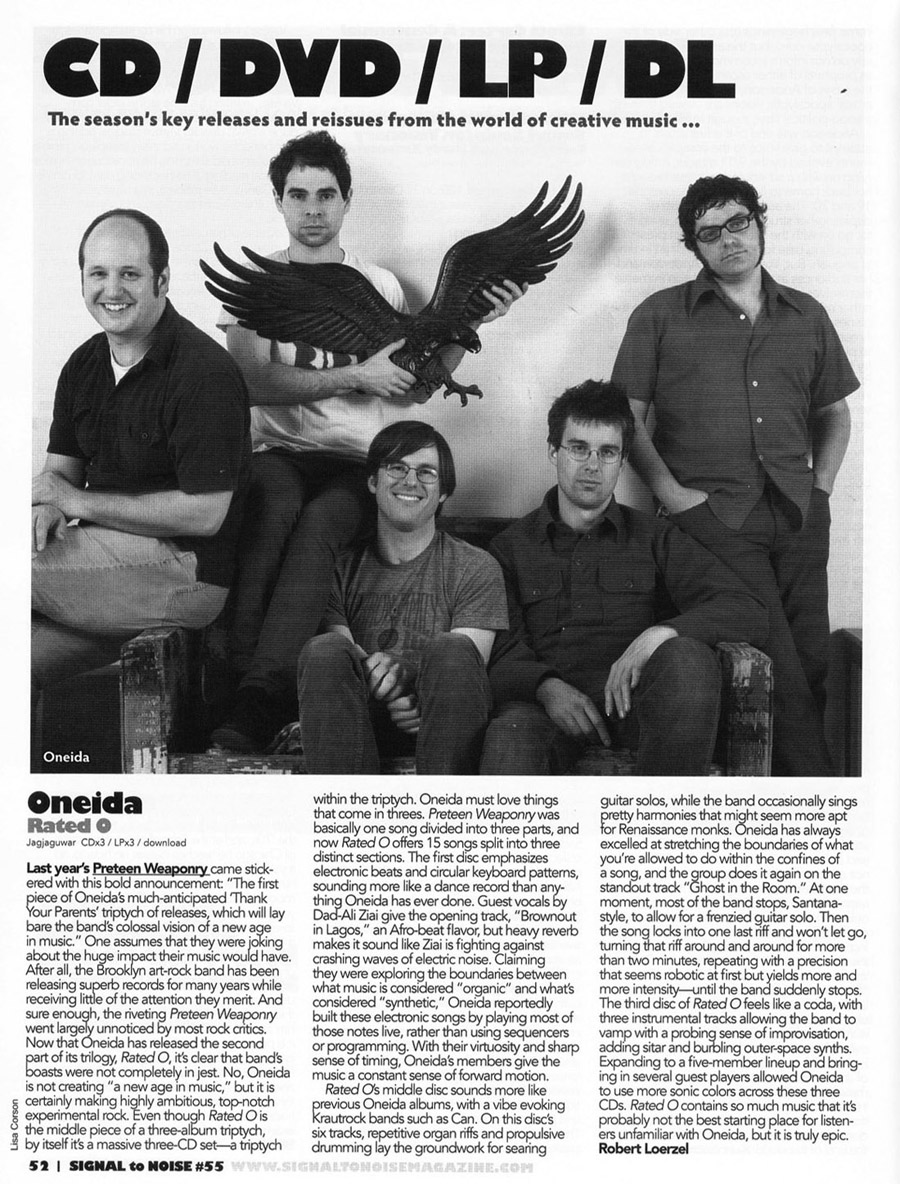This review by Robert Loerzel originally appeared in Signal to Noise magazine’s fall 2009 issue.
 Last year’s Preteen Weaponry came stickered with this bold announcement: “The first piece of Oneida’s much-anticipated ‘Thank Your Parents’ triptych of releases, which will lay bare the band’s colossal vision of a new age in music.” One assumes that they were joking about the huge impact their music would have. After all, the Brooklyn art-rock band has been releasing superb records for many years while receiving little of the attention they merit. And sure enough, the riveting Preteen Weaponry went largely unnoticed by most rock critics. Now that Oneida has released the second part of its trilogy, Rated O, it’s clear that band’s boasts were not completely in jest. No, Oneida is not creating “a new age in music,” but it is certainly making highly ambitious, top-notch experimental rock.
Last year’s Preteen Weaponry came stickered with this bold announcement: “The first piece of Oneida’s much-anticipated ‘Thank Your Parents’ triptych of releases, which will lay bare the band’s colossal vision of a new age in music.” One assumes that they were joking about the huge impact their music would have. After all, the Brooklyn art-rock band has been releasing superb records for many years while receiving little of the attention they merit. And sure enough, the riveting Preteen Weaponry went largely unnoticed by most rock critics. Now that Oneida has released the second part of its trilogy, Rated O, it’s clear that band’s boasts were not completely in jest. No, Oneida is not creating “a new age in music,” but it is certainly making highly ambitious, top-notch experimental rock.
Even though Rated O is the middle piece of a three-album triptych, by itself it’s a massive, three-CD set—a triptych within the triptych. Oneida must love things that come in threes. Preteen Weaponry was basically one song divided into three parts, and now, Rated O offers 15 songs split into three distinct sections. The first disc emphasizes electronic beats and circular keyboard patterns, sounding more like a dance record than anything Oneida has ever done. Guest vocals by Dad-Ali Ziai give the opening track, “Brownout in Lagos,” an Afro-beat flavor, but heavy reverb makes it sound like Ziai is fighting against crashing waves of electric noise. Claiming they were exploring the boundaries between what music is considered “organic” and what’s considered “synthetic,” Oneida reportedly built these electronic songs by playing most of those notes live, rather than using sequencers or programming. With their virtuosity and sharp sense of timing, Oneida’s members give the music a constant sense of forward motion.
Rated O’s middle disc sounds more like previous Oneida albums, with a vibe evoking Krautrock bands such as Can. On this disc’s six tracks, repetitive organ riffs and propulsive drumming lay the groundwork for searing guitar solos, while the band occasionally sings pretty harmonies that might seem more apt for Renaissance monks. Oneida has always excelled at stretching the boundaries of what you’re allowed to do within the confines of a song, and the group does it again on the standout track “Ghost in the Room.” At one moment, most of the band stops, Santana-style, to allow for a frenzied guitar solo. Then the song locks into one last riff and won’t let go, turning that riff around and around for more than two minutes, repeating with a precision that seems robotic at first but yields more and more intensity—until the band suddenly stops. The third disc of Rated O feels like a coda, with three instrumental tracks allowing the band to vamp with a probing sense of improvisation, adding an Eastern flair with sitar and burbling outer-space synths. Expanding to a five-member lineup and bringing in several guest players allowed Oneida to use more sonic colors across these three CDs. Rated O contains so much music that it’s probably not the best starting place for listeners unfamiliar with Oneida, but it is truly epic.
